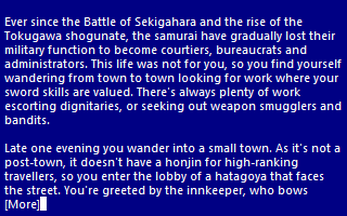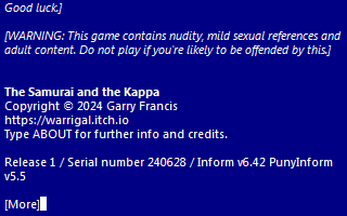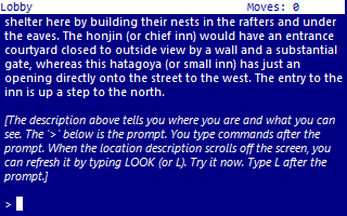
The Samurai and the Kappa (TALP)
Introduction
Ever since the Battle of Sekigahara and the rise of the Tokugawa shogunate, the samurai have gradually lost their military function to become courtiers, bureaucrats and administrators. This life was not for you, so you find yourself wandering from town to town looking for work where your sword skills are valued. There's always plenty of work escorting dignitaries, or seeking out weapon smugglers and bandits.
Late one evening you wander into a small town. As it's not a post-town, it doesn't have a honjin for high-ranking travellers, so you enter the lobby of a hatagoya that faces the street. You are greeted by the innkeeper, who bows deeply and invites you inside. You don't need much coaxing, as you're looking forward to a bath, a meal and a good night's sleep.
The innkeeper enters the inn to make arrangements, leaving you to remove your waraji.
WARNING: This game contains nudity, mild sexual references and adult content. Do not play if you are likely to be offended by this.
Instructions
This is a traditional text adventure that was written for ParserComp 2024, 28 April to 30 June 2024. See the jam page for the competition rules.
A text adventure is a form of computer game that presents you with a story. You take on the role of the main character in the story and control that character's actions. The story has a goal and you will need to solve puzzles in order to achieve that goal. The computer tells you where you are, what you can see and what's happening around you. You can then move around, examine the things you find and manipulate those things by telling the computer what to do using simple English commands.
Commands consist of a verb phrase, optionally followed by a noun phrase. Most commands can be abbreviated to a verb followed by a noun. For example, GET THE BOWL OF MISO SOUP can be abbreviated to GET BOWL or GET SOUP.
If the verb is followed by a preposition, this may alter its meaning. For example, GET BATH will attempt to pick up the bath, but GET IN BATH will attempt to climb into it.
In some cases, the verb phrase and first noun phrase may be followed by a second noun phrase. The two noun phrases are usually separated by a preposition. For example, HIT MAN will attempt to hit the man with your hands (as you didn't specify a second noun phrase), but HIT MAN WITH ROCK will attempt to hit the man with the rock. If you only use a verb and a noun, the game will generally tell you if it needs an extra phrase or implicitly try to deduce what is needed for the second phrase.
Don't panic! It's not as complicated as it sounds. Just use simple English sentences starting with a verb and it will all feel quite natural.
Movement
To move around, use commands like GO NORTH and GO SOUTH. You can move in any of the four cardinal compass directions. To save typing, movement commands can be abbreviated to N, S, E and W. You can sometimes use other movement commands such as IN, OUT, ENTER, EXIT, GET IN or GET OUT. These will be reasonably obvious when the time comes.
Examining things
Make sure you EXAMINE everything you come across, even insignificant things like scenery and objects mentioned in room descriptions, as subtle hints and clues are scattered everywhere. To save typing, EXAMINE can be abbreviated to X. For example, EXAMINE LOBBY can be abbreviated to X LOBBY.
You can also try your other senses when it seems appropriate, e.g. SMELL, TOUCH or LISTEN. Unlike EXAMINE, these actions aren't necessary to solve any puzzles, but may prove useful later in the game.
Manipulating objects
Apart from examining things, most of your time will be spent manipulating objects. Use commands like GET or TAKE to pick up an object, e.g. GET KATANA. Use commands like DROP or DISCARD to drop an object, e.g. DROP KATANA. Use WEAR to wear something, e.g. WEAR KAMISHIMO. Use REMOVE to remove something that is already worn, e.g. REMOVE KAMISHIMO.
To see what you're currently carrying and wearing, use INVENTORY (or I). As you're not a pack horse, you can only carry ten items at a time.
There are many other verbs that can be used to manipulate objects. These will be fairly obvious when the time comes. Common verbs include OPEN, CLOSE, EAT, DRINK, READ and so on. Use PUT, PLACE or INSERT to put objects into containers or on supporters, e.g. PUT COIN IN POUCH.
Communicating with characters
You will encounter a lot of characters in this game. When you first meet new characters, in addition to examining them, you should try talking to them, e.g. TALK TO INNKEEPER. To get further information from them, try asking them about something relevant, e.g. ASK INNKEEPER ABOUT HATAGOYA. This game is primarily about gathering information, so you will need to ask lots of characters about lots of things. You can also try giving them something, e.g. GIVE COIN TO INNKEEPER.
Advanced features
You can use IT or THEM to refer to the noun used in the previous command, e.g. EXAMINE POUCH, OPEN IT (for a singular object) or REMOVE WARAJI, DROP THEM (for plural objects). You can also use HIM and HER to refer to male and female characters used in the previous command, e.g. ASK INNKEEPER ABOUT MAID, ASK HIM ABOUT HIMSELF or EXAMINE MAID, TALK TO HER.
You can refer to multiple objects by separating the objects with AND, e.g. GET TACHI AND KATANA. Using IT and THEM in the next command will only refer to the last of those objects, e.g. EXAMINE IT will refer to the katana.
You can use ALL to refer to all the appropriate objects with GET, DROP, WEAR and REMOVE, e.g. GET ALL to get everything in the current location, GET ALL FROM TABLE to get everything on the table, DROP ALL to drop everything you're holding, but not wearing. Note that when wearing and removing objects, you will have to do this in the correct order, so WEAR ALL may not necessarily work depending on the order that objects appear in the location and REMOVE ALL may not necessarily work depending on the order that objects appear in your inventory.
When using ALL, you can use EXCEPT or BUT to exclude some objects, e.g. DROP ALL EXCEPT TACHI.
Finally, you can enter multiple commands on the same line by separating them with a period, e.g. EXAMINE SCREEN. OPEN IT.
Tutorial
This game was originally written for Text Adventure Literacy Jam 2024 (but not entered), so it includes a tutorial. Tutorial text is shown in [italics inside square brackets]. I'd suggest that you leave the tutorial on and follow the suggestions, even if you're not a beginner, as there are a few important tutorial hints later in the game. You can turn the tutorial off using TUTORIAL OFF and turn it back on again using TUTORIAL ON.
Scoring
There is no score in this game. Your objective is to... Well, that's for you to find out.
Other commands
Use LOOK (or L) to refresh the display.
Use VERSION to get the game version. Use ABOUT or INFO to get background information and credits for the game. Use CREDITS to get the credits only.
Use SAVE to save your progress. Use RESTORE to restore a saved game.
Use UNDO to undo the last move. This is handy if you change your mind or make a mistake. You shouldn't be able to get killed or get into an unwinnable situation in this game. (UNDO is not available with the z3 version of the game.)
Use AGAIN (or G) to repeat the last command.
Use WAIT (or Z) to do nothing apart from pass the time.
Use HELP to get a brief reminder of how to play the game or HINT to get a context-sensitive hint related to the current location.
Use RESTART to restart the game from the beginning. Use QUIT (or Q) to quit without restarting. (Don't use QUIT with the online version of the game, as the game will appear to be locked up. If this happens, press the Back button in your browser.)
Most importantly, have fun and enjoy the game.
Keyboard shortcuts
Some interpreters have keyboard shortcuts. If you are using an interpreter on a computer with a conventional keyboard, most will allow you to press the up and down arrow keys to cycle through your past commands. This is handy if you want to repeat the previous command or correct a typo.
Special instructions
This game includes two puzzles that are a little unusual for a text adventure. The first is a Nurikabe puzzle. The second is a logic puzzle. These types of puzzles are easier to solve using pencil and paper or an online tool, hence two feelies are provided to help you solve these puzzles. It's probably best if you download and print the feelies before you start the game.
How to solve a Nurikabe puzzle
A Google search for "Nurikabe puzzles" will reveal a lot of web sites with rules, solving techniques and sample puzzles. I found the solving techniques at the following sites to be very helpful:
The Nurikabe puzzle included in the game is one of the easiest I could find. If you can't solve it, you can search for an online "Nurikabe puzzle solver". I found a couple, but I'm not going to tell you where, as I want you to solve it for yourself.
How to solve a logic puzzle
A Google search for "logic puzzles" or "logic grid puzzles" will reveal a lot of web sites with rules, solving techniques and sample puzzles. I found the solving techniques at the following sites to be very helpful:
Logic puzzles can be quite hard if you're not familiar with them. If you find the puzzle too hard, use the wonderful online tool at Johannes Singler's web site.
The above link is preconfigured for the logic puzzle in the game. If this doesn't work for some reason, start with a blank puzzle. Set Categories to 4, set Items to 5, select Draw conclusions and fill out the 4 groups of text boxes as per the feelie.
You can now follow the instructions to fill out the positive and negative relations and the solver will deduce other positive and negative relations for you. Assuming you haven't made any mistakes, when the grid is filled, you will have the answer to the puzzle posed to you in the game.
Playing the game
There are two ways to play the game.
- Click the Run game button (above) to play the game in a browser.
- Download the z5 file and play the game using a z-code interpreter (see below).
Finding a z-code interpreter
There are a variety of z-code interpreters for all the major platforms, as well as many minor and retro platforms. There are far too many to list here. The best source of downloads is probably the Interactive Fiction Archive. Navigate to infocom/interpreters for z-code interpreters and interpreters-multi for interpreters that interpret both z-code games and other formats.
Common z-code interpreters
Android: I recommend Hunky Punk from Google Play. (There are others, as well.)
iOS: I recommend Frotz from the Apple App Store. (There are others, as well.)
Linux: See the links above.
Mac: See the links above.
Windows: I recommend Windows Frotz from the infocom/interpreters link above. (There are others, as well.)
Credits
Inform 6 compiler, language and library originally written by Graham Nelson and now maintained by David Griffith, David Kinder, Andrew Plotkin et al.
PunyInform library written by Johan Berntsson and Fredrik Ramsberg based on the Inform 6 library.
ZAbbrevMaker written by Henrik Åsman.
Parchment interpreter written by Dannii Willis et al.
Concept, game design and coding by Garry Francis.
Testing by Ben Ryan, Charles Moore Jr, Gianluca Girelli, Jade J Aincioa and John H Doolittle.
Cover image adapted from the 19th century Japanese parchment Illustrated Guide to 12 Types of Kappa downloaded from Wikimedia Commons.
Tiled background image by Nopadol Uengbunchoo downloaded from Vecteezy under a free licence.
| Status | Released |
| Platforms | HTML5, Windows, macOS, Linux, Android |
| Rating | Rated 3.0 out of 5 stars (2 total ratings) |
| Author | Garry Francis |
| Genre | Interactive Fiction |
| Tags | inform-6, japanese-mythology, mythology, parser, punyinform, Retro, talp, text-adventure, Text based, Tutorial |
| Average session | A few hours |
| Languages | English |
| Inputs | Keyboard |




Leave a comment
Log in with itch.io to leave a comment.